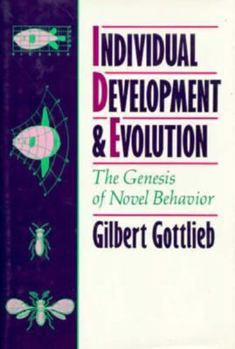Individual Development and Evolution: The Genesis of Novel Behavior
Select Format
Select Condition 
Book Overview
The concept of individual development has played two very different roles in the history of ideas concerning the evolution of species. In Darwin's time, individual development was believed to recapitulate the history of the species. This meant that each evolutionary novelty was added on at the end of individual development in the preceding species. If this were so, as Darwin and others believed, development would be like a motion picture revealing the sequence of a species' evolutionary history. In the 1920s, however, this view shifted to one stressing that early, not late, somatic changes in individual development were responsible for evolution, and many believed these changes were caused by genetic mutations and recombinations. With these views as background, Gottlieb here presents a behavioral theory of evolutionary change that is not dependent on genetic mutation or genetic recombination in its initial stages. Using evidence of the large, untapped, already existing genetic-developmental potential in all species, Gottlieb proposes that developmentally wrought changes in behavior can lead to the evolution of somatic novelties prior to genetic change. Some of these documented behavioral changes include heightened exploratory tendencies, increased resistance to stress, and enhanced problem-solving skills. Written in a scholarly but nontechnical manner, this book will appeal not only to developmental and comparative psychologists, ethologists, and developmental neuroscientists, but also to laypersons interested in behavioral science, evolutionary theory, and the history of modern scientific thought.
Format:Hardcover
Language:English
ISBN:0195068939
ISBN13:9780195068931
Release Date:November 1991
Publisher:Oxford University Press, USA
Length:248 Pages
Weight:0.95 lbs.
Dimensions:0.9" x 5.8" x 8.6"
Customer Reviews
0 rating





